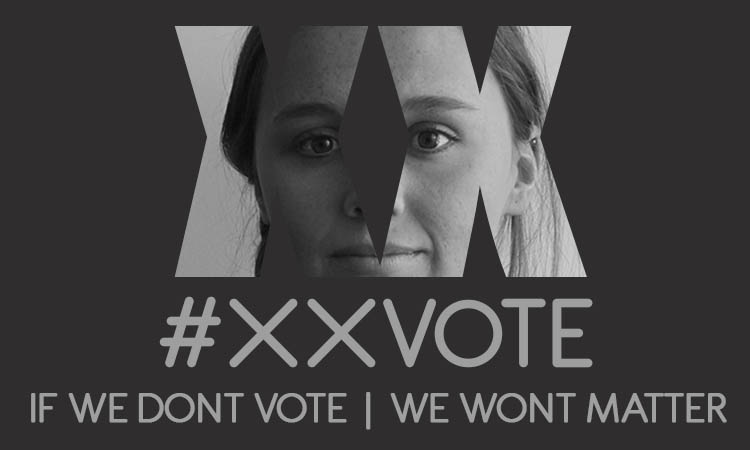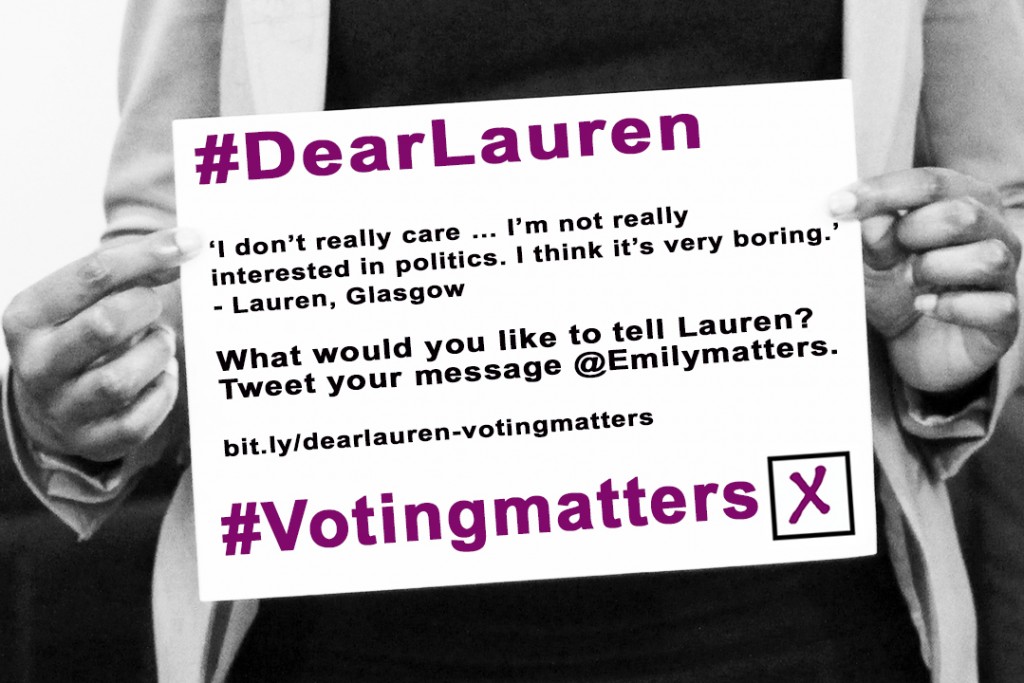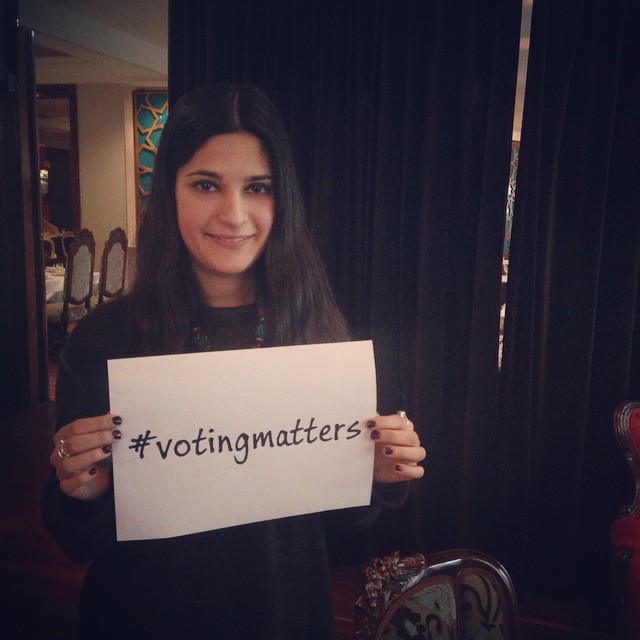Who’s Voting Then?
Young people have a lot to say. Gen Y is outgoing, creative and vocal about everything from the media to human rights, from Kim-K’s ass to sexism. But in 2010, only 44% of 18-24 year-olds voted at the General Election.
So why are we not speaking up when it comes to casting our vote?
I am one of those people who almost didn’t vote (don’t judge me!!!). I actually only voted because a lot of my mates did and I was bored. But if I’m honest I had no interest in voting. Why Yaz? You may ask. Great question!
Here are some reasons why voting just didn’t appeal to me:
a) I didn’t understand what the point was. (How am I (one person) going to make a difference?)
b) Only a handful of my friends voted (that I knew of).
c) I felt that people who understood the politics better than me, would make the right decision for me.
d) I didn’t feel that I could identify with any of the politicians.
e) I didn’t understand the language and political jargon.
f) I was busy with other things like uni, playing music, working on my own projects, work… You know, the usual shebang.
I somehow felt disengaged from the whole process of elections. I don’t remember being introduced to politics at school, and I don’t recall anyone sitting me down and going through the basics. It was off my radar. Completely. Plus, I just thought it was a bit boring really.
Why education is key for getting more young people to vote?
So turns out, voting isn’t just for people that are interested in politics, it’s for everyone. I know! Who knew, hey?!
Engaging secondary school students in a way that is real and relevant is fundamental to getting GenY to speak up. After all, you can only really comment on what you know, right?
At present, it seems that if you want to participate in the discussion you have to be self-motivated enough to do the ground work for yourself, and this can be pretty confusing when you’re a political newbie or first time voter.
Bite the Ballot founder and former teacher Mike Sani commented that education was key to engaging 16-24 year olds in 2015:
‘I came from a school where I wasn’t educated in politics. I taught at a school where young people were not educated in politics. Obviously, yes, we begin to feel powerless and in many cases angry, but we need to ask ourselves why – why do we feel powerless and why do we feel angry? Because we are not told about anything and we are not educated on it. You said there’s no point in voting because we tried that already – we haven’t’.
Having the right to vote but not being taught why we should vote, or how to go about it nullifies the opportunity.
Education empowers young people to vote and gives them the tools and confidence to step out and participate.
Lack of education disempowers young people and excludes them from the conversation from the beginning.
Teaching young people about politics in the national curriculum is not just about creating awareness, it’s about giving young people a foundation of understanding which they can then build upon in adulthood and form their own opinions.

(Image via)
And what about women? WHY is it important we vote?
Child care isn’t the only/primary concern for women these days. Oh no, some of us have jobs and stuff now. Whenever we talk about women’s involvement in politics WHY DOES CHILDCARE ALWAYS CROP UP?? Not all women have children. Not all women want children. Why is this a ‘women’s issue’ – why isn’t this a parents’ issue? Where are the baby daddies? Why are they being excluded? They need baby time too, right?
We need women of ALL ages, social standing, colour, creed and from different roles to build an accurate representation of what the female population need in this country. We need government to stop consulting a select few women when building legislation – because not all women have the same needs. And ladies, the truth is, no one is just going to hand this to us. If you don’t make a noise, they won’t know it’s an issue. The wheel who squeaks the loudest gets the oil. If women want change – WE MUST VOTE. We must roar!!
#EmilyMatters is an initiative started by the lovely actor and writer Kate Willoughby who I had the JOY of meeting last year. Her recent social media campaign #DearLauren encourages young people to open up the discussion about voting and why #VotingMatters. And I would heartily encourage anyone who fancies it to get involved.

(Image via)
#XXVOTE FILM is a new campaign via Youth Media Agency which aims to get more young women voting in the UK.
Each individual can exercise their right to step up, speak out and be game changers….
As for me, better late than never, hey.

Deadline to vote is 20th April 2015, so why not register to vote NOW? It takes the same amount of time to boil a kettle. Glorious, I could do with a cuppa.
Have a great week peeps!
x
If you enjoyed this article, why not check out ‘Education! Education! Education!’?
Tags: #XXVOTE politics UK Elections voting Women youth
Categories: Empowerment: Man! I feel Like a Woman! Fire me up baby! Wise up! Yazmin Joy
3 Comments
Not sure I totally buy this idea that just “teaching politics” in schools is the answer. I actually think there is something to be said by self-motivated study and independent inquiry when it comes to politics (alongside many other aspects of life).
This isn’t to say that some fundamentals shouldn’t be covered in school. For example, how parliament operates and how the country is constitutionally established should be key topics. And to my knowledge, education in civil areas such as the above is typically provided (although the quality of such provision is something probably less than desired).
The trouble with introducing and mandating political education in schools is that it’s very much a subjective area. Politics at it’s heart is about belief, and ideas. Requiring something so personal to then be drawn into the classroom and giving teachers de facto authority is just begging to be open to accusations of bias, demagoguery and unfair/untrue representations.
Education is already enough of a political football that no sensible politician of any stripe would encourage the status quo to change.
Besides, having been in classrooms where political debate has let rip spontaneously, I suspect managing, let alone actually teaching in such environments would be difficult in the extreme. It’s just so sensitive an area it would nigh on impossible to effectively and impartially deliver within.
This isn’t to discredit the possibility though that some other form of political education isn’t achievable. But it would have to be far enough removed from the conventional model of schooling that it probably wouldn’t be practical on a wide scale or through the current system.
Instead, local/individual solutions among individual schools would be the likeliest outcome. Something which already occurs up and down the nation (see some Scottish schools conducting their own independence referendums).
I’m not sure how things happened in the olden days too much, but I personally think it’s best that the largest part of one’s political enlightenment should take place at the behest of oneself. There’s no substitute for finding out what inspires you, what challenges you and what displeases you than self-directed learning. We must shape ourselves first and then go onto shape the world.